THE VISION
Artificial Intelligence is feeding the data-driven digital transformation across industries and evidence-based decision-making by the leadership across companies and local authorities.
It is essential to highlight the meaningfulness of those approaches, transferring them to opportunities. The amount and heterogeneity of data generated allied to the rapid progress of scientific research and consequent technological development allow for a new reality in regards to AI, SDGs and sustainability. While the frequency of the data ingested and the dynamic of what is being observed can dictate the different pace that real-time observation can take, the usefulness of the insightful information digested from that data in the context of priorities within the workflow of professionals will dictate its meaningfulness.
THE SUSTAINABLE DEVELOPMENT GOALS
The Sustainable Development Goals (SDGs) are the 17 global objectives adopted by the United Nations (UN) in 2015 to be achieved by 2030 at a worldwide scale.
These aims address the world’s most pressing challenges, such as poverty, inequality, climate change, and sustainable development, distinguishing specific targets for actionable resolutions since 2017. The SDGs provide a comprehensive framework for governments, organizations, companies and individuals to work together towards a more equitable and sustainable future for all. The data-driven perspective of AI can significantly accelerate progress towards these goals by enabling new solutions, improving decision-making, and unlocking new insights. This IRCAI observatory addresses those SDG-focused challenges through AI, providing the user with a shareable landscape of the impact of AI in the progress of SDGs, and with AI-based tools that allow the user to explore large open datasets and find insight with own observations.
The SDG Observatory was built by the International Research Centre on Artificial Intelligence under the auspices of UNESCO (IRCAI), refocusing existing technology and designing new technological tools, algorithms, data workflows and interactive visualisations to better fit the needs of the stakeholders.
These aims address the world’s most pressing challenges, such as poverty, inequality, climate change, and sustainable development, distinguishing specific targets for actionable resolutions since 2017. The SDGs provide a comprehensive framework for governments, organizations, companies and individuals to work together towards a more equitable and sustainable future for all. The data-driven perspective of AI can significantly accelerate progress towards these goals by enabling new solutions, improving decision-making, and unlocking new insights. This IRCAI observatory addresses those SDG-focused challenges through AI, providing the user with a shareable landscape of the impact of AI in the progress of SDGs, and with AI-based tools that allow the user to explore large open datasets and find insight with own observations.
Indicators View
The Indicators view relies on interactive data visualisation allowing the user to compare progress on specific indicators (e.g. water stress or usage to citizens, industry and agriculture) between countries and regions. This ensures data-driven insights from the data ingested in the system to support evidence-based policy-making for resource optimization evaluating in real-time the Sustainable Development Goals items.
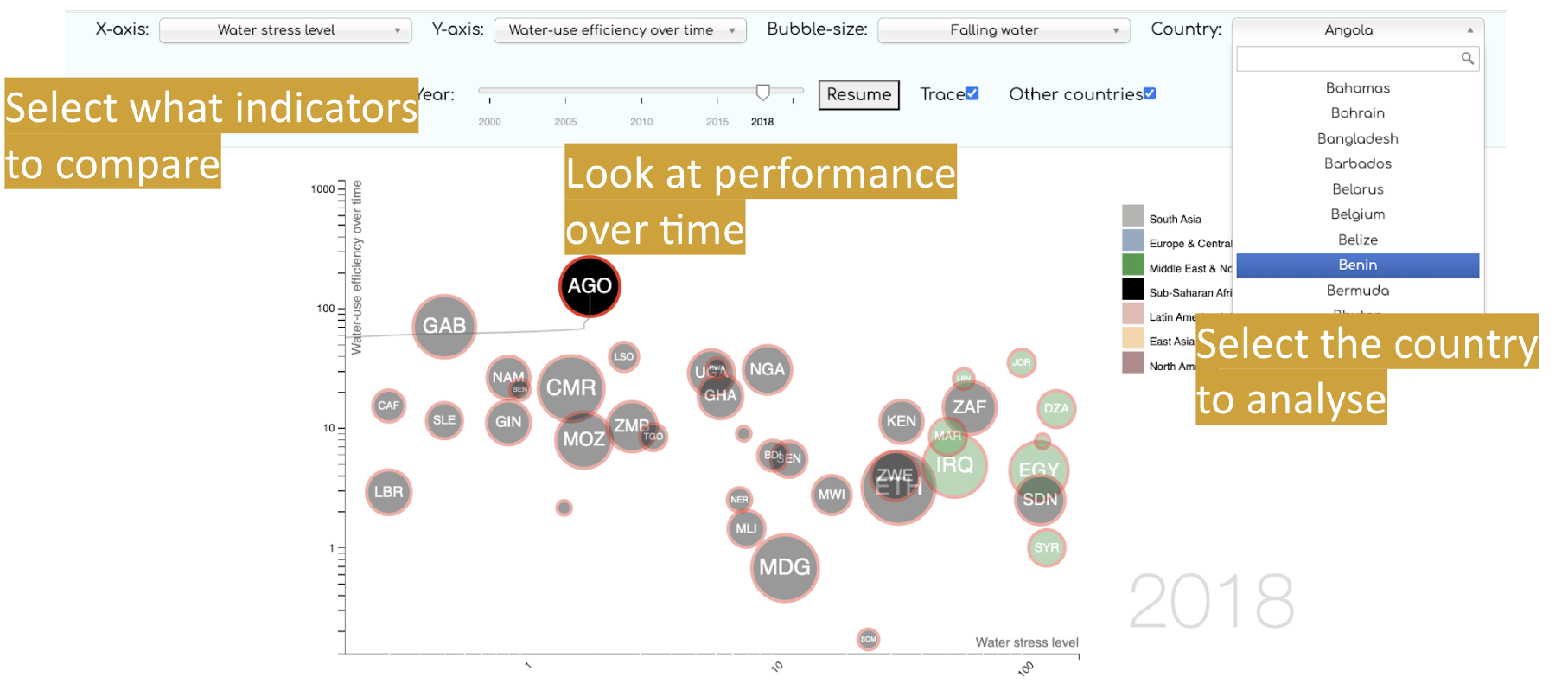
Media View
The media room exhibits insight from world and local news, as well as from social media (Twitter) to monitor and better understand SDG-related events. Moreover, it allows to extract best practices on, e.g., water reuse or extreme water events (e.g. floods and landslide) from millions of worldwide multilingual news to learn from similar cases how to solve SDG-related problems. It also provides access to causal relations and alerts from social media through our Twitter dashboard configured to the priorities and scenarios that are most relevant for your national strategy.
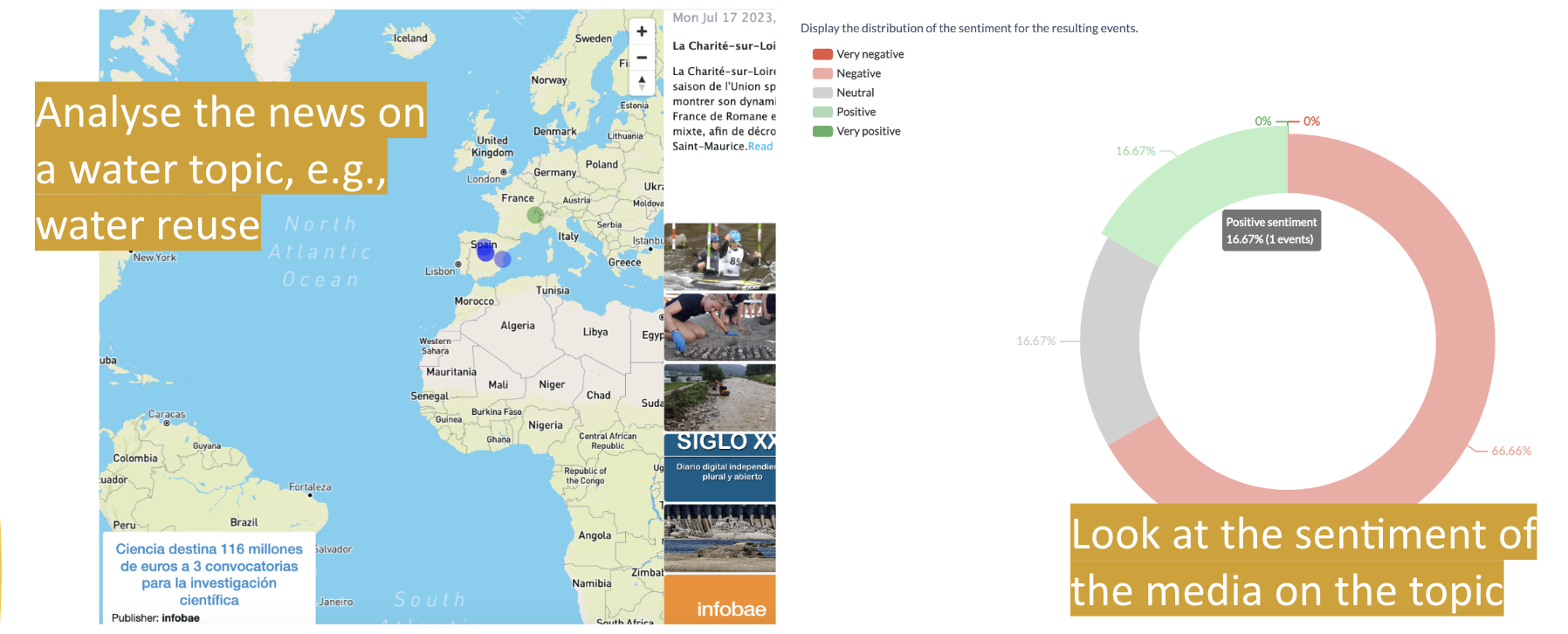
Science View
The SDG Observatory is also providing the user with the access to text-mining tools to improve effectiveness in reviewing a topic over a large dataset of published science and patented technology. It helps the IRCAI user to identify the most prominent water trends from insights on the patented technology (e.g. on wastewater management) exploring the Microsoft Academic Graph (with over 126M patents and articles). Moreover, it provides access to the MEDLINE dataset of the well-known biomedical search engine PubMed to explore problems in, e.g., public-health related topics, and how to find a better fit solution.
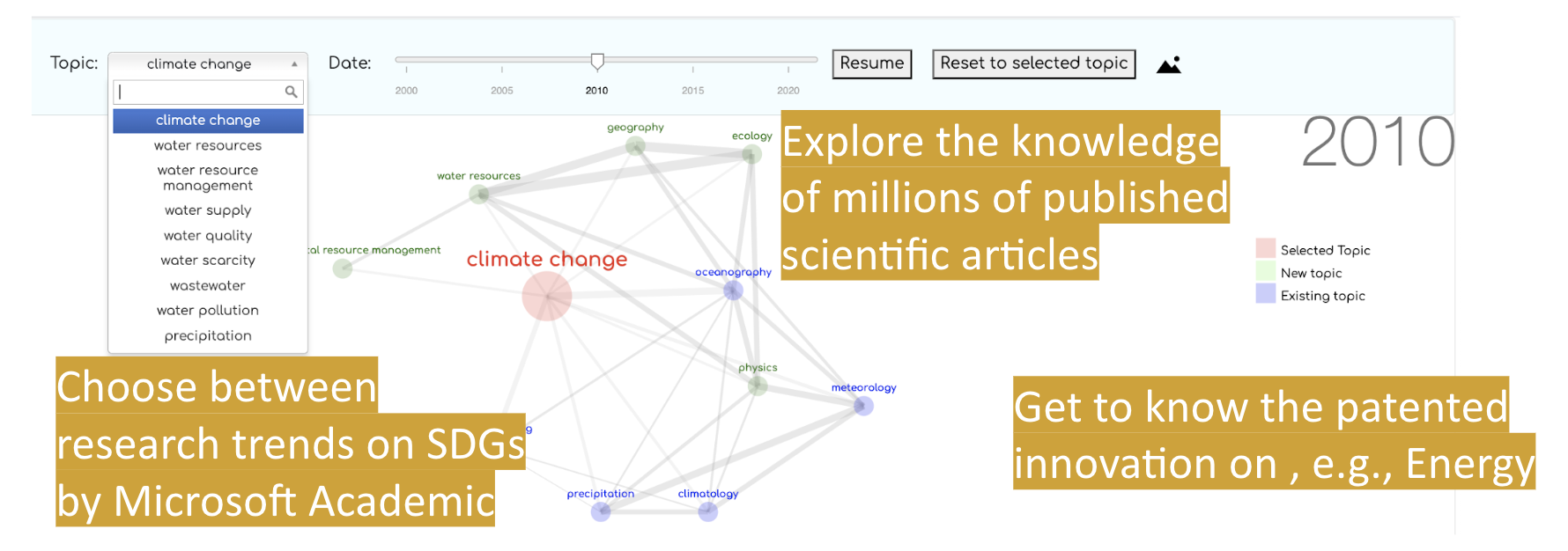
Policy View
The observation of policies applied worldwide on SDGs is fundamental to better understand the progress of the global action. Explore the topics related to the legal and regulatory landscape from open data using sophisticated data analytics and machine learning methods. Review the published legislation and policies about SDG-related topics, making sense of the published policies using interactive data visualisation that can help better refine the search parameters.
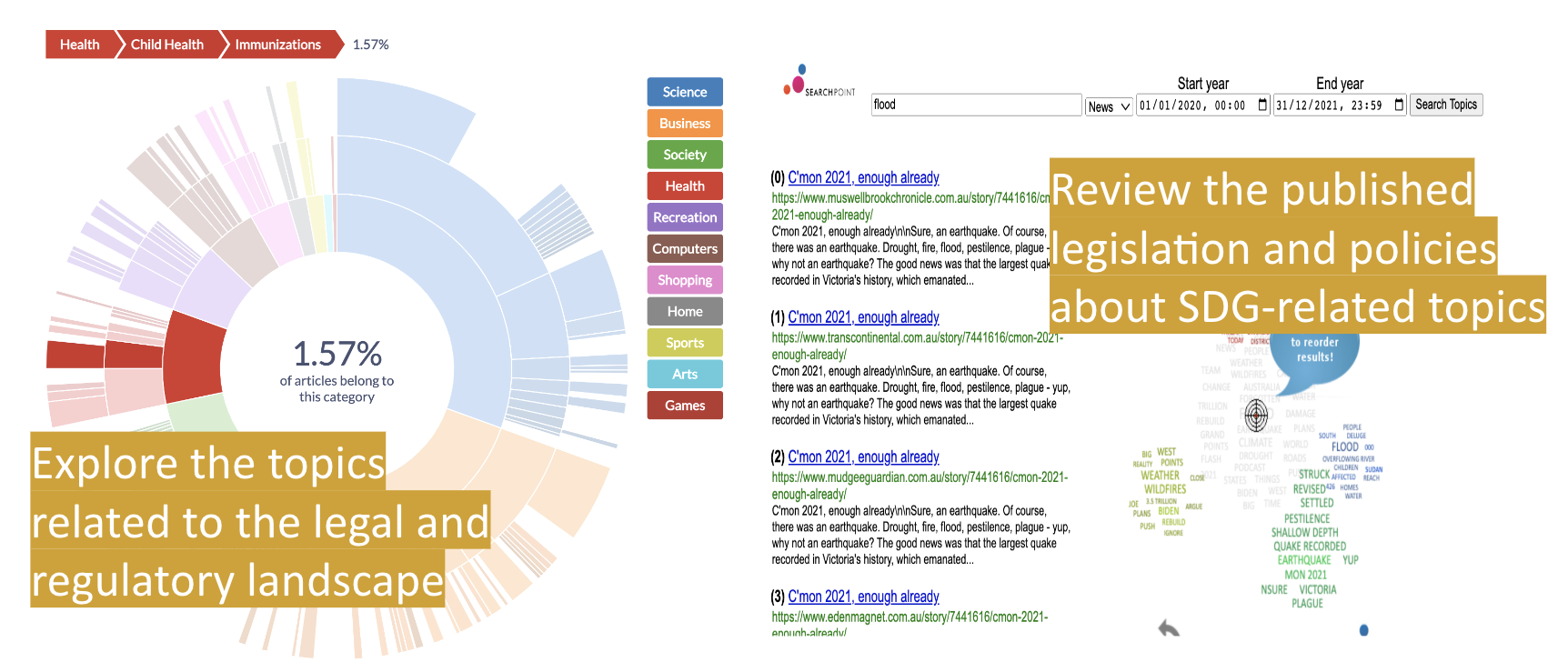
Education View
The IRCAI user can also utilize the Observatory for education in several SDG-related knowledge domains, and educational institutions, local governments and companies can leverage the Observatory to best fit the professionals of the future. Get the most of thousands of insightful learning materials curated by experts at the UNESCO-awarded Videolectures Open Education platform. Empower the staff and the general public with the best practices and knowledge of domain experts that will lead to the improvement of capabilities through new methodologies and tools.
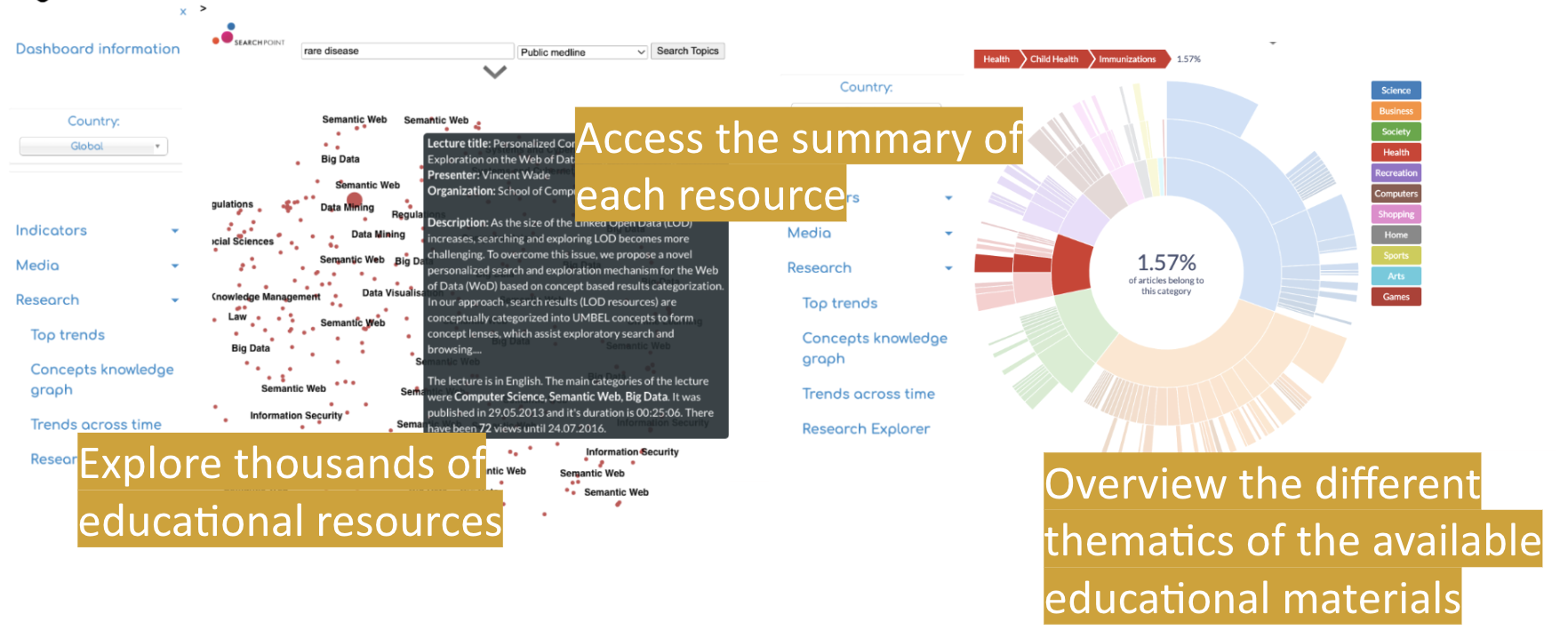
Innovation View
The IRCAI user can also utilize the Observatory for education in several SDG-related knowledge domains, and educational institutions, local governments and companies can leverage the Observatory to best fit the professionals of the future. Get the most of thousands of insightful learning materials curated by experts at the UNESCO-awarded Videolectures Open Education platform. Empower the staff and the general public with the best practices and knowledge of domain experts that will lead to the improvement of capabilities through new methodologies and tools.
